The Pentecost Congress opened on June 8th at 11:00 am with holy Mass at the Original Shrine. It was an international Mass celebrated in German, English, Spanish, and Portuguese. There are about 150 participants from about 30 countries attending the congress. It was lightly raining throughout Mass, but the atmosphere was light and full of joyful hope and expectation.
A New Pentecost for Schoenstatt
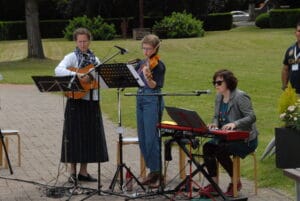
In his homily, Father Juan Pablo Catoggio spoke about Pentecost as an event that perpetually repeats not only throughout the liturgical year but in the Church and in Schoenstatt. It brings about new life. He said that we need Pentecost. In particular, we need:
· “The Spirit of holiness who transforms and renews us
· The Spirit of love who unites and holds us together in freedom and solidarity
· The Spirit of mission that sends us out and makes us fruitful for the world.”
These movements of the Holy Spirit remind us of the main keywords from the Pentecost congress of 2014: holiness, attachments, and mission. Father Catoggio prayed that this congress would bring about a “new Pentecost” for Schoenstatt and for the Church and the whole world.
Father Catoggio’s Homily in English
A World-Wide Movement
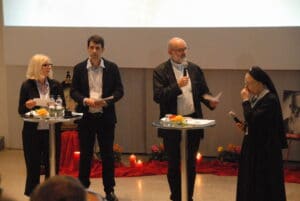
After Mass, the congress reconvened at 2:00 pm (14:00) for a social hour in the Father Kentenich House. This was an opportunity for the participants from different countries to interact with each other and begin to make connections and open channels for discussion.
The opening address of the congress began at 3:00 pm (15:00) and was called Moved by the Spirit of God. Father Heinrich Walter stated two of the biggest crises that the world is facing today, the pandemic and the war in Ukraine, and how insecure these have made people feel. However, he said that the Blessed Mother gave the participants the gift to be able to come together for the congress and that she is helping them in this important work. She is the one who is most interested in this congress, and she intercedes the Holy Spirit for them.
As the hosts of the congress, Richard and Ingeborg Sickinger and Father Jose Luis Correa, introduced each country, all of the participants were able to express their pride in their native countries and in Schoenstatt as an international movement.
The hosts also introduced the International Coordination office and the Continental Coordination office of South America and the important work they have been doing. The International Coordination office represents the Schoenstatt Movement in international events worldwide, such as in large church events, answering important questions in Rome, and many other things. Both offices have the tasks of improving communications and coordinating the life of the movement between the different branches of Schoenstatt internationally and within South America, respectively. This is difficult work, and these offices expressed the need for full-time, committed workers to help them in their missions.
International Exchange of Hopes and Questions
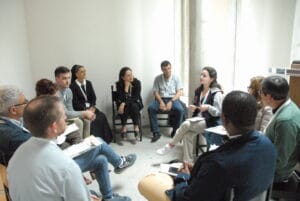
There was a time in the afternoon for open discussion among small groups of participants who speak the same language. These groups wanted to answer the questions: what moves us, and what are our personal desires and longings for the congress. The key themes that came out of these discussions were connected to Father Kentenich, confidence in and renewal of the Schoenstatt Spirituality, hope and joy for the work of the congress and to be spread to others, and the participants’ desires looking forward to the future of the movement such as direction, renewal, instrumentality, internationality and diversity, complementation, bonds and united forces, and the continuation of fruitfulness.
A Momentous Occasion
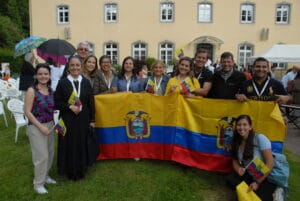
The congress is an occasion for international discussion and sharing. Father Heinrich Walter compared this movement-wide congress to the church-wide congresses of the Vatican councils. It is a time for coming together to grow in communication, international relationships, and understanding, and of combining the Pentecost zeal of each country to form a huge Pentecost fire for Schoenstatt. It is a time to review what the past of Schoenstatt was and the direction that the signs of the times and Divine Providence are leading the movement. It is a time to make a vision for the next phase, the next century of Schoenstatt.
At the end of the congress, a formation team will synthesize all of the themes, decisions, and fruits of the congress into one memorandum. This document will be sent to every Schoenstatt community around the world, to every country, as a useful tool for the future and as a sign of hope and renewal of zeal for the Schoenstatt movement in every corner of the world.
The day closed with prayers to the Holy Spirit for his help and guidance and a visit to the Founder Chapel, to our Pentecost room.
Inspirations from the Day
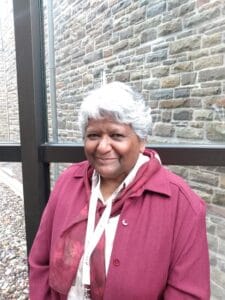
Sister Connie O’Brien, from South Africa, shared that this congress is a wonderful representation of the internationality of Schoenstatt and an opportunity for deeper communication between countries. She had hoped that those who prepared for the congress would have proposed themes beforehand and incorporated the suggestions and feedback of the participants. However, she hopes that, as the congress continues, there will be many more opportunities for discussion about themes that were not included in the schedule such as the modern identity crisis, particularly among the youth, and Schoenstatt’s accessibility for young people. She stressed the importance of active involvement of participants in the planning of their own events as a powerful tool of education and a great means of improving the engagement of the participants in the events. So, she hopes that the creative adaptability of the congress in its topics and schedule will serve as a learning curve for the next congress. She looks forward to the discussions and proposals related to the youth so that she can bring home new inspirations and helpful tools for connecting with them and helping them do discover the answers to the big questions: Who am I and what is my purpose?
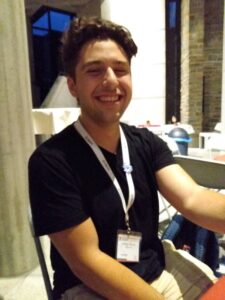
“It was cool! I was nervous, at first, because I thought that I was going to be the only teenager but plot twist!” Santiago Pierobon, from the youth of Argentina, was delighted to see how many young people are attending the congress. The environment in the congress was very uplifting and fertile for making new friends. He was also impressed by the open-mindedness of the older participants at the congress: “Teens can be heard!” He shared that in Argentina it is nearly impossible for the youth to feel heard and understood. He was also pleasantly surprised that the idea of updating certain aspects of Schoenstatt education and terminology was brought up first by the older participants. He looks forward to discussing the future of the youth in Schoenstatt: “They need to be heard and independent.” Also, he hopes to discuss the educational materials, particularly for high school aged youth, which need to be updated and made more accessible to the youth of today. He hopes for the normalization of discussing and debating concrete ways to respond to the difficult questions that permeate society. He said that we need to be “awake to our society.”
